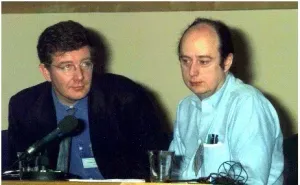Analysing influence has been a central part of academic life. We are very familiar with citation analysis. This is possible because the system allows that metric to be measured and it is seen to be meaningful.
As new measures have become possible in a web environment they too have been taken up. See for example the ‘top of’ lists at SSRN or the elaborate set of rankings from RePEc.
And we are also very familiar with the interest in such measures from individual researchers (it would be interesting to see some analysis of disciplinary differences here – are physicists more interested in their H-Index than geographers?). It is interesting to see influential economics blogger Gregory N Mankiw reference the RePEc list from time to time, for example, as well as other rankings.
As we began to use the web for personal interaction, new measures arose. I am thinking in particular of Technorati and blog rankings which were of interest for a while, although less so now as the blogging environment has changed.
And now we have Twitter. I have been looking at Klout.com recently … with a mixture of intrigue and dread. Klout describes itself as the “standard for influence” and assigns scores using a proprietary algorithm based on Twitter and Facebook interactions and relationships. What is especially interesting about it is how it is trying to leverage the results of its analysis. An interview with founder Joe Fernandez provides some context. “If Klout CEO and co-founder Joe Fernandez has his way, the Klout score will become a new way of measuring people and their influence online.” He makes a comparison with credit ratings:
“Klout is basically your social credit score,” Fernandez says. “Consumers should care because it affects the way employers, companies and everyone looks at your ability to spread information as a critical part of the attention economy today.”
They have an interesting business model.
Then Klout matches relevant influencers to relevant brands, which provide special offers, especially perks like previews on new product launches. For example if you are influential about technology, HP might send you a free laptop. Or you could get a free upgrade at your favorite hotel.
The idea is that these influencers will create social media buzz that can help a product take off. (People have to sign up with Klout to receive the offers.)
Klout seems to be coming over my horizon more often. I have seen several stories about its use in recruitment, where a person’s Klout score is a factor in assessment. Given this interest, it is only natural that there are also critiques of this type of twitter analysis approach in general and of Klout in particular. A moment with Google for example reveals this and this.
Other services exist: Twitalyzer (“serious analytics for social business”) for example and the interesting PeerIndex (“understand your social capital”).
It is clear that personal or social analytics – based on Twitter and other services – is of great interest, and several companies are exploring how to monetise the measurement of personal reputation or influence. The Klout model suggests how such influence might be fungible and gestures to a future in which one’s score might lead to preferential access to services or products. This is an unsurprising development in a world where data about more and more of what we do is mined to provide intelligence for other services (what we spend for example, or where we go on the web).
I need to go now and catch up on my tweeting. I can’t let my score drop … I wonder could it lead to an upgrade on my next transatlantic flight 🙂



